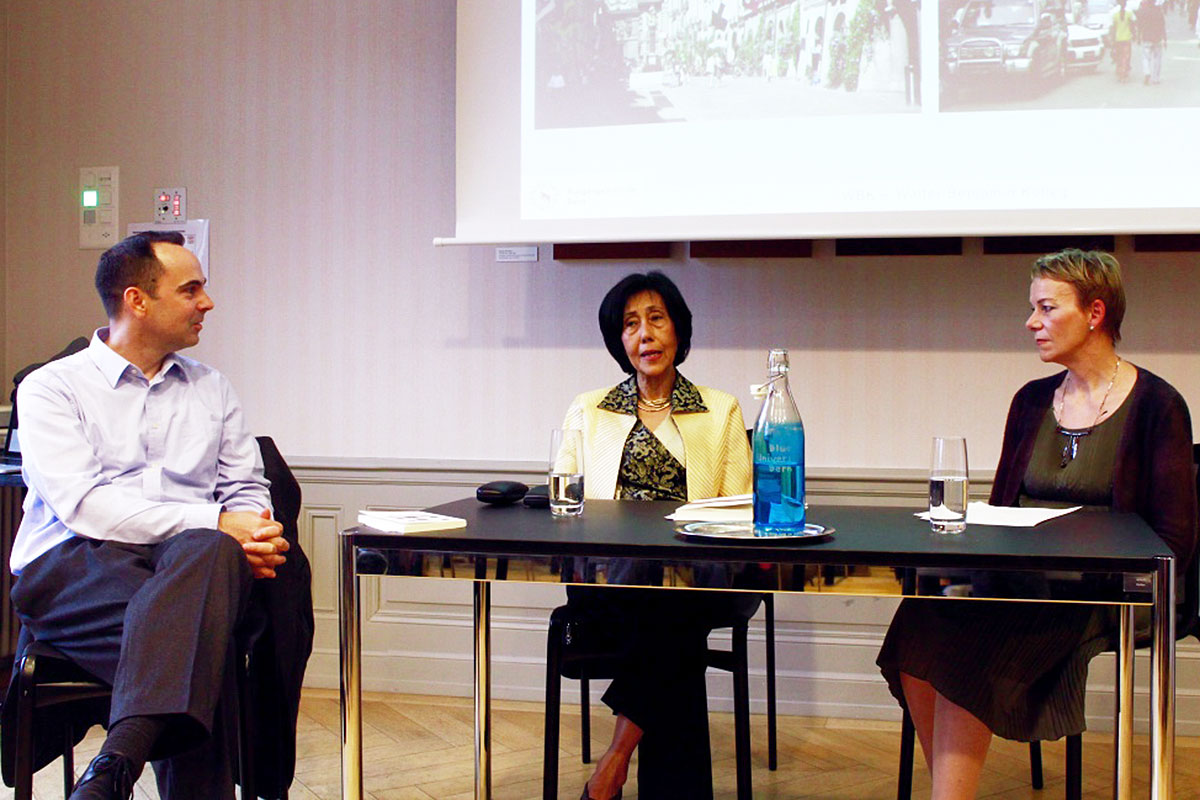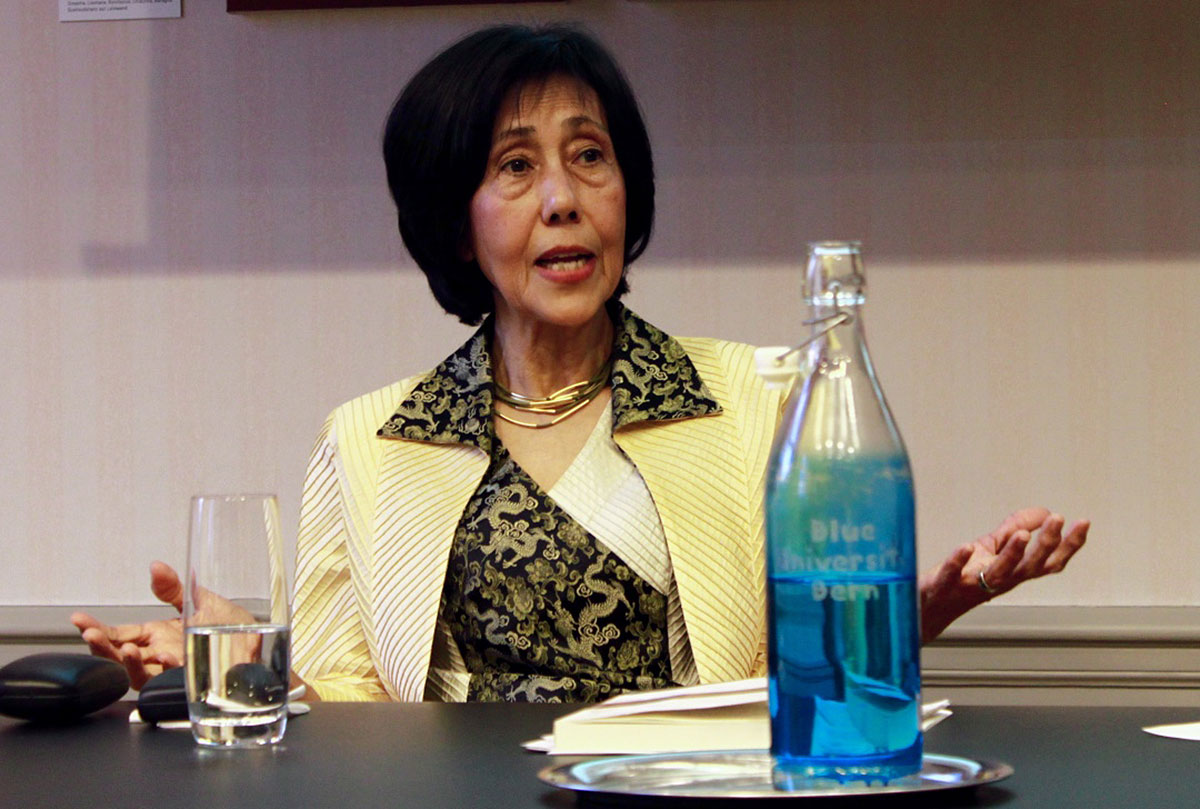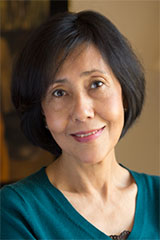"Reading Dürrenmatt was a gloriously awkward experience"
Wendy Law-Yone is the fourth Friedrich Dürrenmatt guest professor at the University of Bern. On the occasion of the inaugural event for her guest semester, the Burmese author recounted her literary connection to Dürrenmatt and to the German language on 22 September in the Haus der Universität. She read excerpts from her book "Irrawaddy Tango" and spoke with anglicist Virginia Richter and the comparatist Oliver Lubrich.
There is a great deal behind Virginia Richter's comparison from early in the evening, "Whoever has read one of Wendy Law-Yone's novels, The Coffin Tree, Irrawaddy Tango or The Road to Wanting, will agree that she is among the guardians of the integrity of the English language just as Kafka is for the German. The Dean of the Faculty of Humanities also places the author, who was born in Mandalay, Burma in 1947, "among those authors that are part of world literature in the truest sense for their movement across borders and mediation between diverse languages and cultures."

"The German language gave me stability and structure"
One look at Wendy Law-Yone's biography confirms Richter's description of the author as a frontier runner and mediator between languages and cultures. Wendy Law-Yone grew up in post-colonial Burma, which gained independence in 1948. After a military coup in 1962, her father, Edward Michael Law-Yone, founder and publisher of the most important English-language newspaper in Burma, The Nation, was arrested for political reasons. This event significantly shaped Wendy Law-Yone's young life. As a consequence, she was not able study music in California as planned and was also banned from studying at the University of Rangoon. "There was chaos all around me," recalls the author, however, "the German language gave me stability and structure." During German classes, which were offered on weekdays by the Goethe-Institut and the German Academic Exchange Service (DAAD) in Rangoon, Law-Yone could escape her everyday life and experience a world of regulation and validation. She describes the importance of German for her life in Graham Greene's words as "a door that opens and lets the future in."
It was through poetry that the author found access to German literature. In Goethe's poems, she recognised her situation as a dissident. During her English presentation, she recited Goethe's "Song of the Harper" from Wilhelm Meister's Apprenticeship in elegant German with a great deal of sensitivity:
"Wer nie sein Brot mit Tränen aß,
Wer nie die kummervollen Nächte
Auf seinem Bette weinend saß,
Der kennt euch nicht, ihr himmlischen Mächte …
[Who never ate his bread in tears,
Who never through the mournful night
Sat weeping on his bed with fears—
He knows not, heavenly powers, your might ... (translated by Margarete Münsterberg)]"
Outrage and delight
However, it was not only her confrontation with Goethe's poetry but also Law-Yone's love for Dürrenmatt that had its beginnings at the Goethe-Institut in Rangoon, which was forced to close soon after the coup in 1962. In its library, which the young German student helped clear, she came into contact with The Judge and his Hangman and The Visit. The Dürrenmatt guest professor recalls how surprised she was by the language, the tone and also the contents of The Judge and his Hangman as Dürrenmatt's work contrasted with all other German prose she had every read up until that point. For her, reading Dürrenmatt was a "gloriously awkward experience" during which she couldn't really decide if she was able to share Bärlach's perplexing concept of justice and morality or not. She also confides to the audience that the main character in The Visit, Claire Zachanassian, aroused "both outrage and delight" in her at the same time. She told of how she loved Zachanassian's "excesses", related to her "cravings for retribution", but then felt "the beating of a very broken heart under all her extravagance, "a heart that would never be granted healing, a heart that primarily consisted of unhealed scar tissue."

Dictatorship and exile as central themes
When she was twenty, Wendy Law-Yone fled Burma, which she described as "the only home I have ever known" for the US. There too Dürrenmatt played an important role in her life. As she didn't have any records to confirm that she had successfully completed school, Law-Yone made inquiries at the Eckerd University in St. Petersburg, Florida about how she might matriculate there. She was allowed to sit the entrance exam for a course in comparative literature where she composed an essay on Dürrenmatt's The Visit. It is thanks to this essay that she was able to study in the US.
Following her presentation, the author, whose works have never been translated into German, reads an excerpt from her book Irrawaddy Tango, which is not easy to digest, in German. She completed the translation herself with the help of a German friend. The excerpt is a scene in a Burmese prison which has autobiographical influences. "Living in a cage reveals extraordinary things. The fact that a human can really nod off and even dream when sitting in a cage in the middle of his own excrement – with urine in one corner and shit in the other. At first, of course, one's stomach turns and the civilised being inside protests."
Among the most important themes in Wendy Law-Yone's work are the experiences of dictatorship and exile, the life between the East and the West as well as the repercussions of Burma's turbulent history on the individual fates of its multi-ethnic population. In answer to the question of what she would like to bring about with her writing, Law-Yone cites Kafka in German, "Ein Buch muss die Axt sein für das gefrorene Meer in uns [A book must be an axe for the frozen sea inside us (translated by Richard and Clara Winston)]". To bring her impressive stories to a close, Wendy Law-Yone thanked Friedrich Dürrenmatt with a self-derisive overtone, "Thank you to Dürrenmatt for the Visit of This Old Lady to Bern."
About the author

Wendy Law-Yone
(Photo: Vanessa Gavalya)
Born in Mandalay, Burma in 1947, Law-Yone lived in the US beginning when she was twenty years old. There she worked as a journalist and published the two critically acclaimed novels The Coffin Tree (1983) and Irrawaddy Tango (1993), in which the fears and experiences of various Burmese exiles in the US are the central theme. A scholarship from the University of East Anglia brought Law-Yone to Great Britain in 2002 as a "David T.K. Wong Creative Writing Fellow", in which country she has taught at the School of Oriental and African Studies (SOAS) at the University of London ever since. In Great Britain, Law-Yone published her third novel, The Road to Wanting (2010), which was nominated for the respected Orange Prize. After more than thirty years in exile, Law-Yone managed to return to Burma in 2001 and 2012. These experiences made it possible for her to complete her most recent work. In Golden Parasol: A Daughter’s Memoir of Burma (2013), Law-Yone follows the life of her father to recount the correlation between her family's history and the colonial and post-colonial history of Burma in an impressive manner. Amid great interest by the local media, Golden Parasol has recently become the first of Wendy Law-Yone's works to be translated into Burmese.
Contact:
Wendy Law-Yone
Institut für Germanistik
Länggassstrasse 49
3012 Bern
Tel.: +41 31 631 83 11
wendy.law-yone@germ.unibe.ch
Friedrich Dürrenmatt Gastprofessur für Weltliteratur
In Bern, the name of Friedrich Dürrenmatt stands for multifaceted world literature. The author, who comes from the Canton of Bern and who studied at the University of Bern, composed prose and essays as well as works for theatre and radio which have been descried in numerous contexts and languages. The Friedrich Dürrenmatt Guest Professorship was established at the University of Bern in the autumn of 2013. Its purpose is to serve as a mediator between science and literature, theory and practice, university and public. Every semester since the spring of 2014, an international author has taught as a guest of the Walter Benjamin Kolleg at the University of Bern. He or she leads classes directed toward all students of the Faculty of Humanities. In addition to the seminars or lectures, the Friedrich Dürrenmatt guest professors have the opportunity to appear at university and public events in Bern as well as in other locations in Switzerland. The Friedrich Dürrenmatt Guest Professorship for World Literature is realised with support from the Stiftung Mercator Schweiz. It is funded by the Burgergemeinde Bern.
The Burmese author Wendy Law-Yone is the fourth Friedrich Dürrenmatt Guest Professor. Her predecessors were David Wagner (Berlin) in the spring of 2014, Joanna Bator (Warsaw) in the autumn of 2014 and Louis-Philippe Dalembert (Haiti) in the spring of 2015.
Contact:
Prof. Dr. Oliver Lubrich
Institut für Germanistik
Länggassstrasse 49
3012 Bern
Tel.: +41 31 631 83 11
oliver.lubrich@germ.unibe.ch